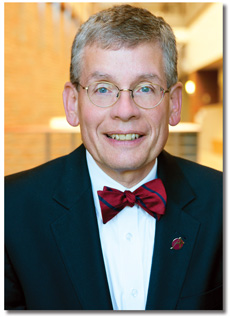
Dr. Paul Pribbenow, President of Augsburg CollegeAugsburg College has exceeded the Central Corridor Anchor Partnership’s inclusionary contracting goal to award a minimum of 10% of total project cost to local, women or minority owned firms in a major construction project.
According to Karin McCabe, Outreach Director at McGough Construction, the general contractor working on Augsburg College’s Hagfors Center for Science, Business and Religion, nearly 13% of the project has been completed by local, women or minority owned firms so far.
“This early success reflects well on our mutual commitment,” McCabe noted. “We know that inclusion and diversity are powerful assets for great work, and this partnership shows that success is all about the infrastructure of relationships.”
Steering Anchor Spending to Create Local Prosperity
The Central Corridor Anchor Partnership (CCAP) seeks to secure regional prosperity in part through spending more with Central Corridor businesses. CCAP has developed several initiatives to create wealth in communities adjacent to the Central Corridor by focusing and aggregating the demand from the Anchor institutions to local suppliers that employ and invest in the community.
Augsburg College is the first CCAP member to utilize the Partnership’s inclusionary contracting policy adopted in December 2014. The policy calls for CCAP members to consider adding contract language on large capital projects of $250,000 or greater that commits to utilizing local, women or minority owned firms for a minimum of 10% of total project cost.
A Matter of Best Practice

Many of CCAP’s public members have committed to similar goals through state contracting requirements. Public institutions and other larger private business corporations in the Twin Cities region have successfully developed best practices and managed economic inclusion policies and programs utilizing Minority Business Enterprises (MBE) and other targeted vendors for many years. General contractors in the region are familiar with economic inclusion policies that target Local Business Enterprises (LBEs) and MBEs and are capable of fulfilling the requirements of such policies without creating significant additional costs.
For Augsburg’s project, the final bid packets have yet to be released for bidding, but already McGough has let contracts totaling $6,762,287 or 12.62% of total project cost to local and minority firms. The largest of these contracts was over $3 million to Twin City Glass Contractors, a woman-owned business located in the Central Corridor geography. Sue Wohlk, CFO of Twin City Glass is pleased with CCAP’s commitment. “We greatly appreciated the opportunity to be part of this,” she stated. “And we hope to be included in future CCAP projects.” The company provides glass, glazing, aluminum curtainwall and storefronts throughout the region.
McGough’s other contracts to MBE firms were for trucking, structural steel and concrete. Looking ahead, McGough expects local and MBE firms to participate in mechanical and fire protection and electric contracts.
On Mission for Augsburg
The Hagfors Center is designed to foster interactions among areas of study, support active learning and connect the College to the community. The new building embodies Augsburg’s commitment to student learning, urban place-making and thoughtful stewardship, according to Augsburg College President, Paul Pribbenow. “Raising over $50 million for a building committed to Science, Business and Religion was a unique feat in itself,” reflected Pribbenow. “It is also deeply meaningful for us that the economics of constructing this great building reflects Augsburg’s values of inclusion and diversity.”
